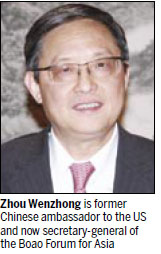US
Experts break down how to invest in US
By Tan Yingzi (China Daily)
Updated: 2010-09-02 17:26
 |
Large Medium Small |
|
 Haier products on sale in a store in New York. The company's vision is to be "global by being local". Provided to China Daily |
BIRMINGHAM, Ala - Several recent media reports about failed Chinese investment attempts in the United States could have slowed down the overseas expansion of many enthusiastic investors in China.
But the investment potential in the US is still very promising with a good business platform and proper business strategies, experts said at the Southern Governors' Association (SGA) annual meeting.
Zhou Wenzhong, the former Chinese ambassador to the US and now secretary-general of the Boao Forum for Asia, is trying to build a bridge between China and US regional businesses.
"For Chinese investors, it is difficult to deal with 50 individual states and so we need to set up a multi-state cooperation, such as with the US South," he told China Daily.

Many Chinese investors, especially small- and medium-sized enterprises, are "very keen" on overseas investments but lack resources and access to business opportunities, he said.
For instance, business data, market analysis and legal services are needed for investors because many are not familiar with the complicated investment environment and legal system in the US.
"In the US, about 95 percent of the investment areas do not need the review from the administration, and Chinese investors should try to avoid investing in the 5 percent sensitive areas," Zhou said.
"If they do invest in the sensitive areas, they should do more homework and consult experts."
Zhou said that with the midterm election in November approaching, pressure on the yuan and increasing trade protectionism may affect potential investment in the US.
"I hope the governors can work with us to improve the important bilateral trade relationship," he said.
Most participants at the meeting were surprised to know there is an established platform, Invest in America, to promote investment in the US.
"It is a best-kept secret so far," Suresh Kumar, assistant secretary for trade promotion and director-general of the US and Foreign Commercial Service, Department of Commerce, said at the meeting.
The program is the primary US government mechanism to manage foreign investment promotion, and focuses its efforts on facilitating inquiries, conducting outreach to investors, providing support for state and local governments' investment efforts, addressing concerns by serving as an ombudsman in Washington for the international investment community and offering policy guidance.
It has the biggest overseas network in China, with about 100 professionals in Beijing, Shanghai, Chengdu, Guangzhou and Shenyang, he said.
Erin Ennis, vice-president of the US-China Business Council, said it is critical to have qualified advisers before considering investing in the US as there are many hurdles in acquisitions such as taxes, human resources and corporate relations.
She suggested that potential investors should talk to advisers earlier rather than later as many Chinese investors seek for advice "almost near the end of the deal and there is little role the advisers can play".
Potential investors were also told to be as transparent as possible to gain a positive attitude from the local community, and make clear the intention of the investment in the US and on how many jobs will be created, how much tax revenue will be generated and how the company will become a responsible corporate citizen.
Shariff Kan, president of Haier American White Goods Group, said his company's vision is to be "global by being local".
The Chinese home appliance producer Haier Group built a factory in South Carolina in 1999 and Haier America has become a role model for many investors.
"Haier America is an American company with a Chinese element," he said. "We never hide this element but we are proud of it."
With more than 95 percent of employees Americans and by using US business practices, Haier America is hardly any different from other local businesses, he said.
He suggested to Chinese investors: You have to know what you want to do.
"You have to have a plan first and have a vision and then go out finding all the options of how to get that vision achieved," he said.
China Daily